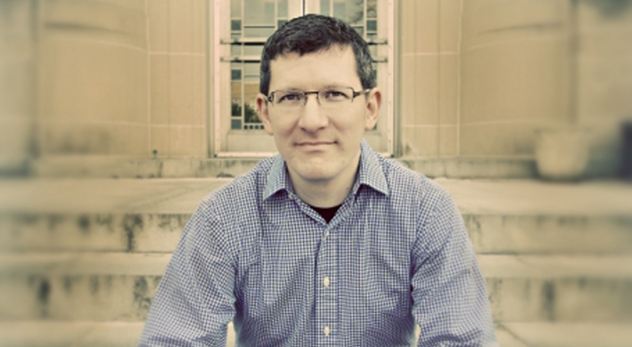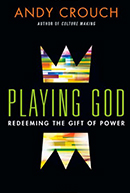In the universe of thinking about Christianity and culture, Andy Crouch may be as close to Yoda as you’ll get.
He is Executive Editor of Christianity Today and a popular speaker at churches, colleges, and conferences. His book, Culture Making: Recovering Our Creative Calling, was named one of the best books of 2008 by Publisher’s Weekly, Relevant, Outreach, and Leadership. His newest and long-awaited book, Playing God: Redeeming the Gift of Power, has just released and is unsurprisingly creating waves. Here, we discuss how Christians have misunderstood power and how he believes they are meant to steward it.
JM: What is your definition of power? How does it differ from, say, Nietzsche’s?
AC: My definition of power is “the ability to make something of the world.” It’s about both the ability to actually transform your environment, and about your ability to interpret and make meaning from the world (the more metaphorical sense of “make something of”).
Nietzsche believed power was ultimately about the strong compelling the weak. You could say that Nietzsche’s ultimate form of power was violence. My definition of power focuses much more on creativity–because I believe the power to create and make is actually much deeper, truer power than the ability to compel or force.
JM: Is power the same thing as authority? If not, what’s the relationship between the two?
AC: Usually we use “authority” to refer to power that is seen as legitimate–that is, power that has earned the right to be used. You could say that authority is “authorized” power. But there are many forms of power that aren’t necessarily “authority” in that sense. If you are young and beautiful, you have power in American culture—even if you haven’t earned authority. If you are a celebrity, you have power—whether or not you have earned it.
JM: Can you say something about Christian attitudes toward power? I don’t hear a lot of Christian leaders and thinkers discussing power.
AC: I started writing Playing God because I became concerned about two Christian attitudes about power. The first was how little we talked about it—the second was how often, when we did talk about it, we talked about power as something that was simply bad and to be avoided.
How little we talked about it: you can’t get much closer to the heart of the ethical challenges of the Christian life than sex, money, and power. But while we are constantly talking about sex, and frequently you hear Christians talking about money, debt, and wealth, you rarely hear Christians talking about power. One mega-church pastor told a friend of mine, “We don’t have power in our church. We’re all servant leaders here.” There is a kind of blindness in saying, “We don’t have power in our church.” Every human community, certainly every religious community, has power, and we aren’t likely to be careful and creative with our power if we won’t even admit it’s there.
And then I was finding that when I did hear Christians talking about power, they were almost always speaking of it as something purely negative, equivalent to violence and domination. Even a very careful ethicist like the late John Howard Yoder used “power” as a synonym for “violence” in his writings. But there is so much more to power than violence. It is better than violence, and frankly, more tricky than violence. Almost everyone agrees that violence is wrong. But what are we to say about the power that attaches to being 25 years old and thin and attractive in a media culture? That is absolutely a form of power. Is it neutral? Is it dangerous? Can it be used for good? Those are the kinds of questions that get papered over when we reduce power to violence.
In the end, I felt that if we say that all power is bad, and that the holiest people should have no power, then we are all going to be hypocrites, deceiving others if not ourselves. Because we do have power. The fact that you and I are having this interview reflects the fact that both of us have power. If we believe power is something bad, we will try to pretend there is no power here—whereas in fact, I think it is good that you have power as an interviewer and reporter and writer, and that I have power as an interviewee and author. I think the more honest thing is to say that power is a gift, but a gift that we can easily abuse, just like all God’s other gifts.
JM: If power is a gift, how are Christians meant to steward that gift?
AC: The purpose of power is flourishing. Flourishing is fullness of being—being everything that we are created to be. And the biblical witness seems to be that human beings are given a special kind of power—”image-bearing” power—that is meant for the flourishing of the world.
No human being flourishes—becomes everything they are meant to be—without others exercising mindful, loving power on their behalf. Because no human flourishes without parents, or persons who fill the role of parents, and parents have tremendous power.
The Christian tradition actually has a lot to say about how we use our power, and for whom. The way of the world is to use our power only on behalf of those “sufficiently related to us” (as Nietzsche said). But Christians are commanded to use their power for the flourishing of those who are not related to them–for the most vulnerable, the most outcast, the poorest and the most marginalized. So while we, like all human beings, are called to use our power for flourishing, we are especially called to use our power for the flourishing of the vulnerable–those who, because of the distorted reality of human societies, are most at risk of not flourishing, not becoming what they are meant to be.
And actually, by the way, the Christian tradition says that we have this image-bearing power not just for the benefit of other humans, even vulnerable humans, but for the benefit of the whole creation. Human cultivation at its best makes it possible for the whole creation to flourish. Sir Ghillean Prance, who is one of the world’s leading experts on the ecology of rain forests, has argued that the extraordinary biodiversity–the flourishing–of the rain forests of South America is actually the result of human interaction with and presence within the rain forest. Not modern, mechanistic, technological human interaction, which tends to simply use the rain forest as a source of natural “resources” that are harvested and depleted, but the kind of interaction that characterizes the premodern peoples who have made the rainforest their home–their presence actually is a major factor in the biodiversity we so treasure. When human beings bear the image properly, the whole creation flourishes.
JM: Bring it home for us, Andy. Can you nail down how our attitudes toward power impact our daily Christian living here on the ground?
AC: If we think power doesn’t exist, we will almost always end up using it, however unconsciously, to protect our own interests, privilege and status.
If we think power is something bad and to be avoided, we will actually end up not seriously loving our neighbor, because to the extent that we refuse to admit that we have real power, we shortchange our own ability, by God’s grace, to create the conditions where our neighbor, especially our vulnerable neighbor, can flourish.
But if we see power as a gift from God (a very temporary gift, by the way—in the blink of an eye all of us will soon be as powerless as we were on the day of our birth, and in one more blink we will die and be completely at the mercy of the power of God to raise us from death) —if we see power as a gift, we will see every person we interact with as an image bearer and will work to restore their image-bearing capacity. If they are cut off from relationship with the One whose image they bear, we will use our power to open up the possibility for them to come back to relationship with their Creator; if they are limited by human structures from expressing their full capacity, we will work to create new culture that makes it possible for them to be everything they were meant to be.
The real test of Christian living, it’s pretty clear from the teaching of Jesus and the example of the saints, is how we use our power on behalf of those with less power–the youngest, the oldest, the most sick, the most marginalized. I think about my niece, who has Trisomy 13, a very disabling genetic disorder. Half of children who are born with this particular chromosomal anomaly die within the first week. But she is 8 years old, entirely because she has been surrounded by love, and countless people—my sister and brother-in-law but also community members, teachers, and countless medical professionals–have exerted their power to make it possible for her to flourish. Christians will do this not just on behalf of our own family members (though of course that’s where it begins), but on behalf of our neighbors and those whom everyone else has forgotten.
In the workplace, we’ll use whatever status and power we have not just for our own career, but to serve and advance the careers of others whom many people may not expect to succeed. Teachers will invest extra time in the C and D students, not just the A students.
JM: But what about powerless or power-deficient people? I mean, if a person without power were to get their hands on Playing God, what’s in it for them? Any hope?
AC: What a great question. The great good news of the whole Bible is that God is on the side of those who do not seem to have much power. I actually don’t believe there is any living human being who is “without power”—to be alive is to have power, and to be a human being, even in the most difficult and degrading circumstances, is to have the dignity and delight of dominion given to us by God in creation. So there are, strictly speaking, no “powerless” people. But for those who are relatively lacking in power, the great good news is that God has taken their side, and there is power available to them that the “powerful” will never know.
In the book, I tell the story of being in New York City the night after the Rodney King verdict in 1992, when people feared riots across the country. I tell about being in a Hispanic Pentecostal church that night, and the extraordinary power that showed up, in the palpable presence of the Holy Spirit, as the congregation interceded for their city. I have rarely experienced such power in any setting, and it was a power that came among people whom the world would count as “powerless.” I’ve come to believe that is a very short-sighted way of seeing people.
There is, I should add, one category of people who are powerless–those who lie in the dust of death. And the amazing news is that God’s own Son went there, to the utter powerlessness of death, and death could not hold him prisoner. The true power at work in the world is the power of resurrection, and it reaches even Hell itself. So the good news is that no matter how powerless you feel, the Son of God has visited that place and returned, and he now wants to pour out his powerful Spirit on you to bear his image in the world, and in the world to come. That is very good news indeed.







